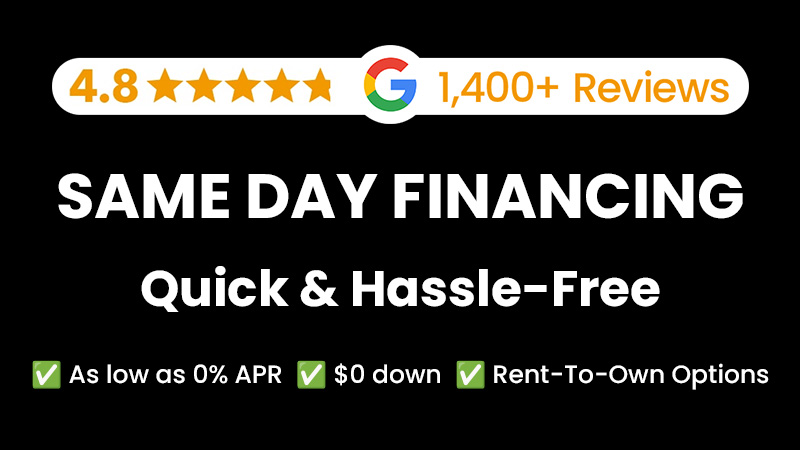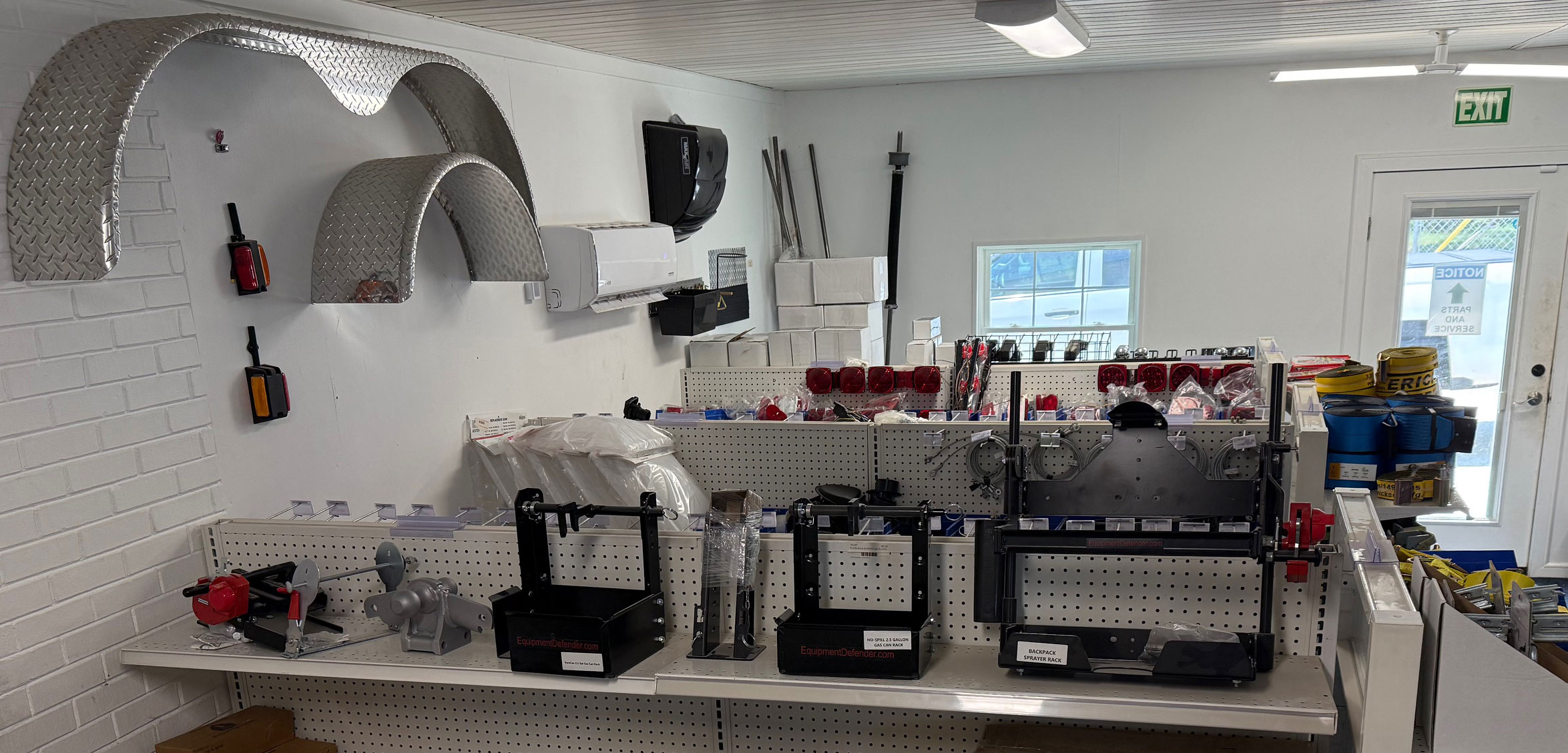Purpose of this Guide
This extensive guide was created to simplify your trailer-buying journey. Whether you're a first-time buyer or someone with prior experience in buying trailers, the process can often be complex and filled with industry-specific terminology. With this useful guide to trailer buying, we hope to make the decision-making process smoother and more informed for you.
Overview of Content
We wanted to provide a detailed walk-through of the typical trailer buying process, starting with defining your requirements to the point of making a purchase. We provide an in-depth explanation of key trailer terminology, helping you decode the language of the trailer world. We will also dive into selecting an appropriate type of trailer based on your needs and give you insights on buying new versus pre-owned trailers. We will share some pointers on assessing a trailer’s quality and navigating the realm of trailer pricing and financing. Next are laws and regulations surrounding trailer ownership, ensuring you're well-prepared to meet all the necessary legal requirements. We wrap up with some tips on maintaining your trailer and operating it safely.
Our goal is to instill the knowledge you need to make an informed decision on your trailer purchase.
Defining Your Trailer Requirements - Understanding Your Hauling Needs
Before you start browsing through different types of trailers, it's important to first understand what your hauling needs are. This includes the weight and dimensions of the items you plan to haul and the conditions in which you will be hauling (like off-road conditions, weather, etc.). Also consider the ease of loading and unloading items onto the trailer, as some trailers come with specific features to aid this process.

Landscape & Utility Trailers
Versatile, open-air trailers typically used for transporting general cargo and equipment like:
Lawncare (mowers, trimmers, blowers), side-by-sides, ATVs, motorcycles, golf cars, gardening supplies, trash, furniture

Car Haulers
Designed for transporting vehicles, ranging from:
Automobiles, side-by-sides, ATVs, golf cars, go-carts

Equipment Trailers + Flatbed Trailers
Specifically designed for hauling heavy equipment and materials like:
Tractors, skid steers, forklifts, scissor lifts, mini-excavators, equipment attachments, automobiles, construction supplies (pallets), hay, building materials

Gooseneck Equipment Trailers
Designed for maneuverability and some of the heaviest payloads, capable of hauling:
Larger/heavier equipment, attachments, multiple equipment, construction supplies, and building materials (pallet)

Enclosed Trailers
These trailers come with walls and a roof, protecting the elements and added security for your cargo and supplies like:
Equipment, automobiles, tools, recreational vehicles, motorcycles, furniture, trash, construction materials, food/concessions

Dump Trailers
Designed for transporting and unloading heavy materials, these trailers come equipped with a hydraulic lift system for hauling things like:
Skid steers, mini-excavators, trash, debris, construction materials, landscaping materials, generators
Frequency of Trailer Use
The frequency of trailer use also plays a crucial role in the buying decision. If you plan to use the trailer daily or weekly, you should prioritize durability and ease of use. On the other hand, if you'll be using the trailer only occasionally, you might prioritize cost or storage convenience. Remember that a more durable, high-quality trailer may have a higher upfront cost, but could save you money in the long run due to lesser maintenance and repair needs.
Considerations for Your Tow Vehicle
Check your vehicle's towing capacity (owner's manual or online) to ensure it can handle the weight of the trailer plus the load you plan to haul. Think about the type of hitch your vehicle has (or can accommodate) as this determines the type of trailer you can tow. Check you have the proper electrical package for the trailer (a 4-way flat plug for a trailer that doesn’t have brakes or a 7-way round plug and a brake controller for a trailer with electric brakes). Some trailers have “uncommon” plugs and need an adapter.
A bumper pull hitch is common and can tow most types of trailers, while a gooseneck hitch is needed for larger, heavier trailers. A reputable trailer dealer can help you with the towing capacity, electrical, controller, and hitch options for your vehicle.
By considering these points, you can effectively define your trailer requirements. Remember, there is no 'one size fits all' in the world of trailers. Your unique requirements and circumstances will help guide you to the perfect trailer for you.
Decoding Trailer Terminology - Importance of Familiarity with Trailer Terms
In the world of trailers, you'll often come across specific terminologies and abbreviations that may sound foreign at first. However, these terms are critical to understanding the features and functionalities of different trailers and thus make an informed buying decision. They encompass aspects like size, capacity, configuration, and safety features. Familiarizing yourself with these terms will help you understand the specifications listed in trailer descriptions and communicate effectively with sellers or other industry professionals.







Importance of Familiarity with Trailer Terminology
- GVWR (Gross Vehicle Weight Rating): This refers to the maximum total weight a trailer can safely carry including its own weight. This is an important figure to consider when matching a trailer to your towing vehicle and payload. Exceeding this weight can lead to poor performance or damage to your trailer or tow vehicle.
- Payload Capacity: This is the amount of weight that a trailer can carry, excluding the weight of the trailer itself. This will dictate what you can and cannot haul on your trailer.
- Axles: Axles distribute the weight of the trailer and its load evenly across the wheels. Single axle trailers are generally lighter and more maneuverable, suitable for light loads. Tandem axle trailers, with two axles, can handle larger, heavier loads and provide better stability at higher speeds.
- Tongue Weight: This is the weight that the fully loaded trailer exerts downward on the hitch of the tow vehicle. Too little tongue weight can cause the trailer to sway; too much can cause handling problems with the tow vehicle.
By understanding these key terms and others in the trailer lingo, you'll be able to determine the type and design of the trailer that suits your needs the best. In the following sections, we will explore these terms and others in more detail, helping you to become a more informed trailer buyer. A detailed list of trailer terms can be found in the Trailer Glossary section of this guide.
Aligning Trailer Type with Your Needs
Determining the right trailer for your needs involves aligning the specifics of your haul with the features of the trailer. Here are a few considerations:
- Nature of Your Load: The type of cargo you need to transport should primarily influence your choice of trailer. For instance, if you need to transport a car, a car hauler would be appropriate. If your cargo needs protection from the weather, an enclosed trailer would be ideal.
- Load Size and Weight: The dimensions and weight of your load also matter. You must choose a trailer type with adequate capacity and the right dimensions to accommodate your load. Remember to consider both the payload capacity and the GVWR.
- Ease of Loading and Unloading: If your operations involve frequent loading and unloading, consider how easy it is to perform these tasks with each type of trailer. For instance, flatbed trailers offer easier access to cargo than enclosed trailers.
- Security: If your cargo is valuable and requires extra security, an enclosed trailer could be a better choice.
By aligning your requirements with the features of different trailer types, you can narrow down your options and find the trailer that best fits your needs.
New vs. Used trailers: Weighing Pros & Cons

Critical Factors When Purchasing Used
Exercise due diligence! Used trailers can have hidden issues that can be expensive to fix. Brake pads and hubs need to be inspected by a professional trailer technician. Most warranties are only 1 to 3 years from first purchase, so a detailed assessment is a must before agreeing to purchase used.
Here are some key considerations when evaluating a used trailer:
Condition: Check for signs of excessive wear and tear, rust, or structural damage. It might be worth hiring a professional for an in-depth and thorough inspection.
Identify the signs for determining the condition of a used trailer:
- Rust: Check for rust, especially on the trailer frame. Some surface rust is normal, but deep rust can weaken the structure
- Tires: Look for worn-out tires, which could indicate that the trailer was overloaded or poorly maintained
- Flooring: Inspect for signs of rot or damage, especially in wooden decks
- Brakes and Lights: Hookup the electrical to the trailer and test the brakes and lights to ensure they are functioning properly
Maintenance History: Request a maintenance record if purchasing from a private seller. A documented history of maintenance is a clear indication that the trailer has been well looked after. Conversely, when buying from a dealership, they generally provide thorough inspections, undertake necessary repairs, and perform preventative maintenance. Always ask for these records before making your purchase decision.
Price: While used trailers are generally less expensive than new ones, researching the average prices for the specific model you're interested in is advisable to ensure you're getting a fair deal.
The decision between buying a new or used trailer ultimately rests on various factors, including your budget, needs, and preferences. Regardless of your choice, comprehensive research and thorough inspections are pivotal steps before finalizing your purchase.
Choosing the Right Trailer Dealership
Navigating through the numerous trailer dealerships available can be a daunting task, but having a reputable dealership to partner with on your trailer-buying journey can make all the difference. A trustworthy dealership offers a high-quality product AND excellent customer service AND after-sale support. Things to consider:
Reputation and Reviews:

Read reviews about the dealership on platforms like Google and other review sites. Consider the overall rating, the number of reviews (a high rating on a few dozen reviews isn't as good as a high rating on hundreds or more reviews), how recent the reviews are (current vs. months/years old), and how the dealership responds to both positive and negative feedback.
Know What The Sales Department Can Do For You
Financing: A dealership should offer a robust selection of purchase options and lenders to ensure you get the most competitive rates and terms that meet your budget, making the purchasing process smoother and more affordable for you.
Inventory: The dealership should have a good selection of trailers in stock and readily available for purchase. Be aware that some dealerships may list trailers on their website that they don't actually have at their location, or they are “on order”.
Titling and Registration: A dealer providing this service will save you hours at the DMV, and allow you to start using your new trailer with a single or multi-year tag at purchase. Dealers will often include a documentation (doc) fee to cover internal costs, along with the normal tag, title, registration fees you would pay at the DMV.
Trade-in and Buy backs: A dealership that accepts trade-ins ensures you can upgrade or replace your trailer at a fair price, based on the current market, the condition of the trailer, and any needed repairs. A dealership that offers to buy back of your trailer can make it convenient for you when you no longer need your trailer.
Life Long Support - Parts & Service Department
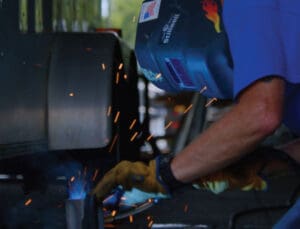
A dealership with a parts department is crucial as it can supply you with accessories, upgrades, and replacement parts when you need them.
Ensure the dealership has an in-house service department capable of carrying out any warranty work or maintenance needed on your trailer. Over time, trailers require preventative maintenance and replacement of wear items. A service department at your dealership means you can rely on them for the continued support your trailer needs.
Professional Customer Service
Make sure the dealership provides professional customer service. Whether you're calling or visiting in person, the dealership staff should be courteous, eager to help, timely in responding, and knowledgeable about trailers and the buying process. Choosing the right dealership is as crucial as selecting the right trailer. The relationship doesn't end with your purchase but continues through the lifetime of your trailer, making it worth investing the time and effort in choosing wisely.
Decoding the Factors that Impact Trailer Price
A myriad of factors determine the price of a trailer. Key considerations include the type of trailer, its size, construction materials, brand reputation, and any additional features like enhanced suspension systems, tilt or ramp systems or custom-built options. Newer models will naturally cost more, as will well-maintained used trailers. Furthermore, the supply and demand dynamics in your local market can also impact pricing.
Pros & Cons of Various Financing Options
Like any significant purchase, trailers can be financed. Dealerships typically offer financing options. You may also have options for personal loans or even home equity lines of credit, depending on your financial situation. It's important to understand your budget along with the terms of the loan, including interest rate, monthly payment, and length of the loan.
Dealerships with robust financing departments have the ability to add security to your trailer investment through various coverages such as GAP insurance, service contracts, theft protection, tire and wheel protection programs and more. These coverages help protect you for the unexpected and are often much less expensive than upgrading through your existing auto or homeowners insurance policies.
Strategies for Ensuring a Fair Price
While some dealerships build-in room negotiation into their trailer prices, others adopt a no-haggle, best-price-upfront model. It's beneficial to research prices from reputable dealers to understand what a fair price is for the trailer you're interested in. Knowing your budget is also essential. If you plan to finance your trailer, be aware of your monthly payment and down payment limits. Many dealerships can adjust the loan terms to accommodate your monthly payment budget.
While understanding trailer pricing and financing may seem daunting, being informed about what affects trailer prices and being knowledgeable about your financing options equips you to make a financially sound decision when buying your trailer.
Understanding Trailer Laws & Regulations - Licensing and Registration Requirements
Before you hit the road with your new trailer, it's crucial to understand the licensing and registration requirements in your region. In most places, a trailer must be registered with the local transportation or motor vehicle department. Registration generally requires proof of ownership, which can be established with the purchase receipt or a bill of sale along with a title or Manufacturer's Certificate of Origin (MCO or MSO).
Additionally, specific licensing requirements such as a Commercial Drivers License (CDL) may apply to tow a trailer, particularly for larger or commercial trailers. One such requirement includes the Combined GVWR (GCWR) of the tow vehicle and the GVWR of the trailer exceeding 26,000 lbs. Obtaining a CDL often involves passing a special driving test and paying additional fees. Always check with local regulations to ensure you're properly licensed and your trailer is correctly registered.
Decoding Weight Limits and Load Laws
Each state or region has specific weight limits and load laws that govern how much weight you can legally tow. These rules often depend on the Gross Vehicle Weight Rating (GVWR) of your trailer and towing vehicle, among other factors. Exceeding these limits can result in fines or other penalties. It's essential to understand and abide by these laws to avoid penalties and ensure the safety of yourself and other road users.
Understanding Compliance with Safety Standards
Trailers must meet a number of safety standards. Depending on the size and type of your trailer, these can include requirements for lighting (like brake lights and turn signals), safety chains, brake systems, and more. Large trailers may require additional equipment, such as reflectors or wide-load signs.
In many areas, trailers are required to pass regular safety inspections to ensure they continue to meet these standards. Non-compliance can lead to penalties, and more importantly, can compromise safety on the road. Always ensure your trailer is in compliance with all local and national safety regulations.
In conclusion, understanding trailer laws and regulations is a crucial part of trailer ownership. A reputable trailer dealer should serve as a guide to helping you understand these laws and regulations. Ensuring you meet all legal requirements not only keeps you on the right side of the law but also contributes to safer roads for everyone.
Proper Maintenance & Safe Operation - The Crucial Role of Regular Maintenance
Regular maintenance is integral to the longevity and optimal performance of your trailer. Maintaining your trailer can prevent breakdowns and help ensure that it's always ready to haul when you are. Routine maintenance tasks often include checking and adjusting tire pressure, packing the axle bearings, checking and replacing brake pads if necessary, lubricating hinges and latches, and inspecting the hitch and lighting system for any signs of wear or damage.
An annual preventative maintenance service by a reputable trailer dealership service center is recommended to perform the recommended maintenance including servicing the axle, hubs, and bearings along with inspecting the tires, electrical and brakes.
Remember to inspect your trailer before every trip. This can help you catch and fix small problems before they become bigger ones. Even if your trailer has not been used for a while, it's important to perform these checks as issues may arise due to idle time.
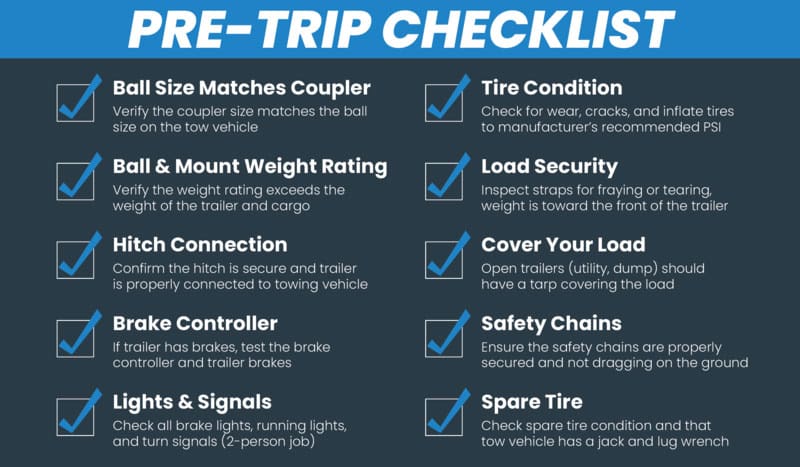
Key Safety Tips for Operating Your Trailer
Safety should always be your priority when operating a trailer. Here are some key tips:
- Load Correctly: Distribute your cargo evenly across the trailer's axles and secure it well. An unbalanced load can make the trailer difficult to control. 60/40 rule: 60% of your load weight in front of the trailer axles, 40% behind. Ensure load is properly strapped down and dump trailer loads are covered with a tarp.
- Safeguarding Your Cargo: It is essential to secure your load properly for safe transportation. Thoroughly inspect your straps for any signs of fraying or tearing, and replace any that show these signs of wear and tear. Always use straps and chains with a working load limit that exceeds the weight of the cargo or equipment you are securing. If you are using a dump trailer, cover the load with a tarp. This step is vital for both ensuring the safety of other road users and avoiding hefty fines.
- Towing Speed: Remember that a loaded trailer will take longer to stop, so slow down and leave plenty of space between you and the vehicle in front.
- Use Your Mirrors: Install wide-view mirrors if needed and use them frequently to keep an eye on both the trailer and the traffic around you.
- Check Your Connection: Always double-check the hitch connection, safety chains, and lighting system before starting your journey.
Safe operation of your trailer requires attentiveness, preparation, and respect for the vehicle's size and weight. Remember, safety first is always the rule of the road.
Recap of Essential Points from this Guide
We started this comprehensive guide by emphasizing the importance of understanding your specific trailer requirements, including the hauling needs, the intended purpose, frequency of use, and towing vehicle capacity. After you establish your needs, the guide went into depth about the various terminologies related to trailers, with a focus on key features such as GVWR, payload capacity, axles, and tongue weight.
To help you make the right choice, we offered insights on different trailer types and how to align them with your specific requirements. We also compared the pros and cons of new versus used trailers, guiding you through the factors to consider when buying a used trailer.
The guide provided advice on assessing trailer quality, from the basics of trailer construction to identifying signs of wear and tear. We emphasized the critical role of quality tires and the state of the trailer hitch.
Navigating the landscape of trailer pricing and financing, we decoded the factors that influence trailer prices and weighed the pros and cons of various financing options. We also shared strategies for negotiating a fair price.
Laws and regulations around trailer usage were also highlighted, offering an overview of licensing and registration requirements, weight limits, load laws, and safety standards compliance.
Lastly, the guide underlined the importance of regular maintenance and safe operation of your trailer, presenting key safety tips to keep in mind while using your trailer.

Encouraging Words for the Trailer Buying Journey
Choosing the right trailer for your needs can seem like a daunting task given the multitude of options and factors to consider. However, remember that it's a process. Take your time, do your research, and feel confident in your decision. Use this guide as a reference tool as you embark on this journey.
The right trailer can make your work easier, your leisure time more enjoyable, and provide you with the ability to transport and haul as needed. Here's to a smooth journey on the road to finding your perfect trailer. Safe travels!
Trailer Glossary
- ATP (Aluminum Tread Plating): A type of surface texture used on trailers, particularly for flooring or ramp applications. It's designed to increase traction and resist wear.
- Axle: The shaft on which the wheels of your trailer rotate, trailers can have single, tandem (two), or dual tandem (four) axles.
- Bumper Pull or Tag Along: A trailer that connects to a ball hitch that is attached to the tow vehicle’s frame or bumper.
- Car Hauler: A trailer specifically designed to transport other vehicles, they can be enclosed or open.
- Curbside: The passenger side of your trailer in the US.
- Deckover Trailer / Flat Bed Trailer: A trailer with a surface that extends over/above the wheelbase, allowing it to use the maximum available width allowed on the road.
- Dovetail: A sloped portion of the deck at the rear of some utility, enclosed, and equipment trailers. It reduces the angle between the ground and the trailer ramps, making it easier to load vehicles and equipment.
- Dump Trailer: A trailer equipped with a hydraulic dump system, typically used to haul dirt, debris, and various other materials.
- Dual Tandem Axle: Two axles with two sets of wheels (4 wheels total per axle), greatly increasing hauling capacity and stability.
- Enclosed Trailer: Any trailer with an enclosed roof and sides. It often has a rear ramp door or two rear barn doors and typically one small side exit door. Also referred to as a cargo trailer or box trailer.
- GAWR (Gross Axle Weight Rating): The maximum weight that can be loaded on any of your trailer axles.
- GCWR (Gross Combined Weight Rating): The total of your tow vehicles GVWR and your Trailers GVWR.
- Gooseneck: A type of hitch that extends into the bed of the towing vehicle, usually a truck, providing a more stable towing experience.
- GVW (Gross Vehicle Weight): The total weight of your loaded towing vehicle, including all cargo, people, and fluids.
- GVWR (Gross Vehicle Weight Rating): The maximum total weight your vehicle and trailer can safely handle, including the weight of the trailer itself, any cargo, and the tongue weight.
- GTW (Gross Trailer Weight): The same as GVW, but applies to your trailer’s fully loaded weight. When connected to the vehicle this includes the tongue weight.
- Landscape Trailer: A trailer designed for hauling landscape equipment, typically similar to an open utility trailer but with added features to secure tools and equipment.
- Open Trailer: A trailer without supporting structures, walls, roof, etc. The can include landscape trailers, equipment trailers, dump trailers, car haulers, tilt trailers, etc.
- Payload Weight: Weight of the load hauled on the trailer.
- Maximum Payload Capacity: The total amount of payload weight you are able to add to the trailer.
- Pintle Hitch: A type of tow hitch that uses a ring-to-hook or ball configuration for a more secure mount that's ideal for rougher terrain.
- Rock Guard: Metal or aluminum tread plating on the front of most enclosed trailers to protect the exterior from rocks, dirt, and debris.
- Side Rails: Typically seen on open utility trailers, these structures help contain cargo.
- Single Axle: A trailer with only one axle and a single set of wheels.
- STP (Steel Tread Plating): A type of surface texture used on trailers, designed for increased traction and durability.
- Street Side: The driver’s side of your trailer in the US.
- Tandem Axle: A trailer with two axles and a single set of wheels per axle, which increases hauling capacity and stability.
- Tongue Weight: The downforce or weight from the tongue of the trailer on the hitch of your towing vehicle.
- Towing Capacity: The amount of weight your vehicle can tow
- Nose: The aerodynamic front end of some enclosed trailers that comes to a "V", helping the trailer "cut" through the air as it is towed and providing a few extra square feet of space inside the trailer
- Overall Weight Distribution: The arrangement of weight on your trailer to ensure safe driving conditions and less wear for your trailer and tow vehicle.

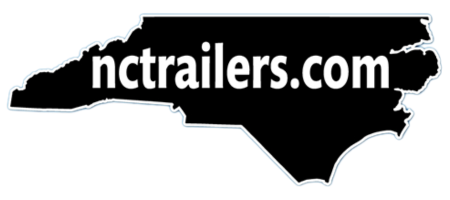

 About the Author
About the Author